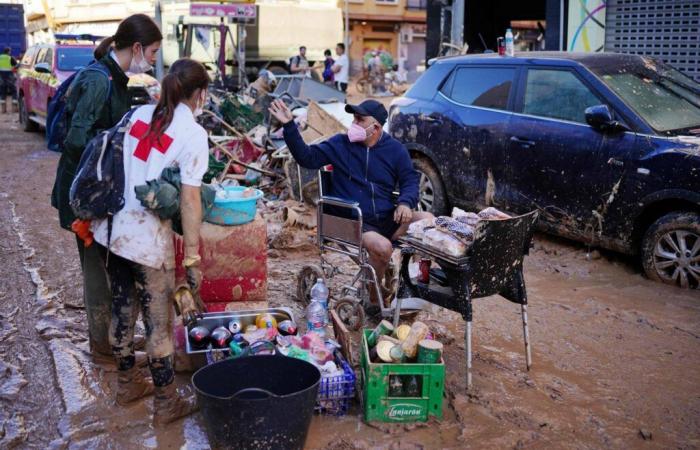According to the latest report from the emergency services released on Saturday evening, 213 people died due to the torrential rains which fell during the night from Tuesday to Wednesday in the south-east of Spain.
It is about “the biggest natural disaster of the recent history of our country”, said Prime Minister Pedro Sanchez, who accompanied King Felipe VI and Queen Letizia to the affected regions on Sunday.
The Valencia region and the Spanish Mediterranean coast in general regularly experience, in autumn, the phenomenon known as “gota fria” (“cold drop”), an isolated depression at high altitude which causes sudden and extremely violent rains, sometimes for several days. But the phenomenon had never reached such magnitude.
The latest news live
9:36 a.m. – At least 1,900 missing?
In the flooded areas, we heard dozens and dozens of reports that people were in parking lots. Based on calls to 112, emergency services estimated the number of missing at 1,900.
But this figure should be taken with a grain of salt. Some people have since returned home and do not always warn in this case.
The major point of concern, apart from the cars tangled or scattered for kilometers by the Turia river, and sometimes buried under one or two meters of mud, are the large shopping centers of Valencia.
Despite the alert, the authorities did not close them. How many people trapped in it? How many basement dramas?
8:21 a.m. – Economic aid
Saturday evening during a press conference, the conservative president of the Valencia region, Carlos Mazon, announced a battery of economic aid and promised the return of order, while acts of looting were reported in several stores, leading to the arrest of 82 people.
“There are people who may have felt alone, helpless, unprotected and I understand that”recognized the elected official. But “I want to send a clear message, we will help all households” which require it, he continued: “We are facing the challenge of our lives and we are going to find the solutions.”
The regional government of Valencia, and Carlos Mazon in particular, are the subject of criticism for having sent a telephone alert message to residents late on Tuesday, while the meteorological services had placed the region on “red alert” in the morning.
Criticisms rejected by Mr. Mazon, who ensures that he followed the protocol in force and highlighted on Saturday “the spirit of solidarity of the population” of his region in the face of adversity.
8:20 a.m. – Search of car wrecks
According to the government, a Spanish Navy amphibious ship including operating theaters and carrying helicopters and vehicles is expected in the port of Valencia.
Authorities expect the toll to rise as car wrecks piled up in tunnels and underground parking lots in the worst-hit areas are now methodically examined.
If the chances of finding survivors are diminishing, the priority of soldiers and police remains according to the executive the search for the missing, with the restoration of roads and infrastructure to allow the delivery of aid and the restoration of essential services.
According to the authorities, more than 2,000 damaged cars and trucks have already been removed. Electricity has also been restored to 94% of residents who had been deprived of it, and telecommunications are gradually being restored.
8:19 a.m. – The equivalent of a year of rain
According to the Spanish meteorological agency (Aemet), in certain localities the equivalent of “a year’s precipitation” fell in a few hours.
This deluge is linked to a “cold drop” phenomenon, an isolated depression at altitude quite common in autumn on the Spanish Mediterranean coast, probably aggravated by global warming, according to scientists, a warmer atmosphere being able to contain more humidity and make precipitation heavier.
8:16 a.m. – In Chiva, between anger and fatalism
Oscar Hernandez, 75, is in “anger”. This resident of Chiva, a town in the province of Valencia severely affected by flooding, denounces the passivity of the regional authorities: “Here, we are dying.”
His own house is disfigured. Dozens more are in ruins. Gaping holes on every street corner, clouds of mud… Even the church did not escape the flood.
Ironically, the retiree claims to have received an alert on his cell phone… “two days later”.
8:15 a.m. – The endless nightmare of the victims
Waist-deep in water, firefighters probe the dark water on which pieces of wood and trash float. Their fear: finding the bodies of new victims, four days after the tragic floods which devastated the south-east of Spain.
In this underground tunnel in Alfafar, in the suburbs of Valencia, several cars got stuck when torrents of mud swept through several towns in the region on Tuesday evening, killing at least 211 people.
If the sun has returned, the basements are still “all flooded”explains Javier Lopez to AFP, shaking his hands covered in mud. “Now that they have started to drain the water, I imagine that we will discover a fairly high number of victims.”
On the evening of the tragedy, this resident managed to take refuge in a safe place after seeing a “waterfall” of muddy water rushing into the tunnel, right next to his home.
The latter, now, is devastated. Just like his business, located in the neighboring town of Benetússer. “The office, the building, the vehicles, the cars that we had on the street… Everything is lost”sighs Javier, dejected, alongside his friends who have come to help him remove the mud that has entered the ground floor of his house. “We are all in shock,” he insists.
8:14 a.m. – “No sense” in playing this weekend in La Liga
Atlético Madrid coach Diego Simeone said on Saturday that there was no “no sense”according to him, to play La Liga matches this weekend after the deadly floods which hit eastern Spain.
Two matches in the affected areas, Real Madrid's trip to Valencia and Villarreal's match against Rayo Vallecano, were postponed, but Simeone said all matches on matchday 12 should have been called off.






